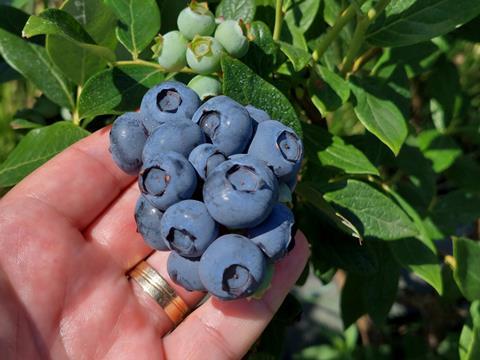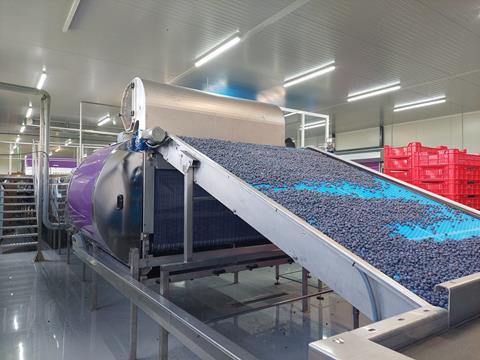The Romanian blueberry specialist is reacting to changes in the climate, as well as the challenge of soaring costs, but its commitment to organic remains undiminished, according to sales director Radu Niculescu
Parts of Europe experienced record temperatures this year. How has production been affected by the weather in Romania? Is the climate becoming more of a factor?
Radu Niculescu: The MerryBerry farm is located in the southern part of Romania, and this year we experienced a rainy period in June with moderate temperatures, which delayed the start of the harvest season by 7-10 days. In July, we had extremely hot weather, which led to the ripening of several varieties in a short period of time.
In Romania, the climate plays an important role, and the changes of recent years have encouraged us to take strategic decisions to protect us from extreme phenomena. For the coming years, we have several projects planned to cover our plantations with macro-tunnels, so that we can extend the harvesting season to four months, from the beginning of June to the end of September.
How is production at MerryBerry? Is production continuing to rise overall?
RN: Blueberry production at MerryBerry increased by 20 per cent between 2021 and 2022. This trend will continue until 2024/25 when we expect production to reach around 1,500 tonnes.

Have you made any recent investments in your facilities?
RN: In 2020, we completed the construction of the MerryBerry refrigerated warehouse. Located in the middle of the plantation, it allows us to obtain the shortest transit time from picking to processing of no more than 15 minutes. The warehouse has a total area of 2,500m2, three pre-cooling rooms and five cold rooms with controlled atmosphere and represents an investment of over €3m. The warehouse has fully demonstrated its usefulness, allowing us to process and capitalise on the entire harvested production.
In 2021, we continued the investment plan and installed in Romania the first computerised sorting and packaging line from MAF Roda. It has 16 bands and allows the identification of internal and external defects, each fruit being rotated and analysed thoroughly. Along with the sorter, we installed an automatic palletising system, a tray sealer, a denester, an automatic metal detector and a weight checker. This investment exceeded €2m.
In 2022, we installed the last part of the equipment of the sorting line, consisting of an automatic tipping machine and an independent feeder to fill punnets. All these investments have allowed us to reach the highest quality standards requested by our customers.

How are rising costs of energy, materials and transportation affecting the company?
RN: One of the most urgent problems is the increase in energy, material and transport costs. On our farm, we analysed the situation and made the best decisions to reduce consumption both internally by optimising flows and externally by negotiating fixed rates during the season. But it is very difficult to unilaterally absorb increases in the cost of electricity, natural gas and diesel of 300, 250 and 85 per cent. Packaging costs have doubled. The margins with which we operate are small and can only partially cover the cost increases.
The situation remains challenging for the 2023 season as well, especially since all these cost increases show no signs of recovery.
With cold storage more expensive, is there a desire for growers to sell faster?
RN: Yes. Fresh fruit accounts for more than 95 per cent of our traded volumes. We had been planning to develop more frozen products, with major investments in the IQF freezing tunnel, but changes in the cost structure have led us to postpone these plans.
How are your main markets currently performing, including the domestic market?
RN: The Romanian market is currently growing at a fast pace, and we are helping to educate Romanian consumers. Although the achieved volumes are still small compared to mature markets, the prospects are good. In our case, we have increased our volumes to EU countries due to the lower transport costs and minimal paperwork. However, the UK still represents the main market for our blueberries.
Is labour availability a problem at all?
RN: The workforce represents a major challenge. We had the advantage of working with workers who have a lot of experience on farms in Spain, Italy, the Netherlands, Germany or the UK. They became team leaders and trained other pickers in our plantation. The Romanian government has initiated a set of measures by which it wants to make the agricultural labour market attractive. Starting in June 2022, the value of the minimum wage in agriculture and the food industry increased by 32 per cent. Tax reductions on incomes were also applied.
This year we used workers from Asia for the first time in a pilot project. The integration was good, as were the results obtained. I think we will continue this project next year.
Are you continuing with your sustainability efforts despite all the challenges?
RN: Sustainability is in our DNA. The management made the decision that the entire area will become organic in the next three years, a brave decision but one that reflects our philosophy towards the environment and a healthy lifestyle.
Since 2021, we have managed to exclusively use 100% rPET punnets. This year we used cardboard packaging, whose share will increase substantially in the next two years. We have created green borders around the plantation and next year we will invest in a photovoltaic system. This will help us to reduce our electricity costs and, at the same time, use green energy as much as possible. Sustainability is the direction we are following, but the measures must be aligned in reality. It must be done with great care so that the necessary investments during the transition period may be accepted by the consumer. We have confidence that we will succeed.



